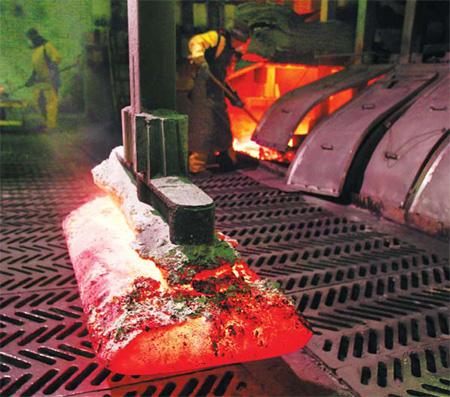
An aluminium billet is moved from the electrolysis bath at a Rusal plant in Sayanogorsk, Russia. The company plans to raise $2 billion to $3 billion through its share sale. [Agencies]
China Investment Corporation (CIC) may invest up to $300 million in the proposed Hong Kong float of Russian aluminum producer United Co Rusal, a source close to the sovereign wealth fund said yesterday.
CIC is, however, yet to take a final decision in this regard, as buying into the highly indebted company is still viewed as a risky investment, the source told China Daily on condition of anonymity.
Russian tycoon Oleg Deripaska's aluminum firm's plan to raise between $2 billion and $3 billion through its Hong Kong initial public offering (IPO) has been overshadowed by huge debt concerns.
The listing has been approved by the Hong Kong market regulator on condition that there would be no retail subscription.
Rusal had rescheduled its nearly $16.8 billion debt earlier this month. The proposed Hong Kong listing would value the company at between $16 billion and $22 billion with an indicative price range of $13.7 to $18.9 per share, according to Russian newspaper Vedomosti.
Apart from CIC, New York-based asset management firm BlackRock, Russian state development bank Vnesheconombank and state-controlled Sberbank have indicated willingness to participate in the IPO.
"Investment could be a tentative step for CIC, as it is still wary about the potential risks embedded in buying into a company with such a huge debt burden," said Wang Lixin, an analyst with Umetal Research Institute.
"Investment in the aluminum industry could bring decent returns, as aluminum prices have stabilized recently on the back of recovering global demand," she said.
CIC has accelerated steps to invest in energy and resource-related companies globally, including the $2.2 billion investment in Virginia-based wind generator AES Corp and HK$5.5 billion in domestic renewable energy company GCL-Poly in November, as well as the $500 million investment in SouthGobi, a Canada-based company that mines coal in Mongolia in October.
The fund, which was set up in 2007 to manage part of the nation's burgeoning foreign exchange reserves, appeared to have made a turnaround from a year ago when it faced criticism for its loss-making investments in Morgan Stanley and Blackstone.
Lou Jiwei, chairman of CIC, said in October, that the fund had invested half of its $110 billion available capital and had gained decent returns.
Sources indicated that the fund is likely to get another $200 billion capital infusion in the near term, partly due to its good performance during the financial slowdown.





